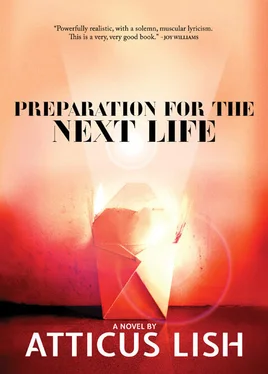She read the bilingual directions on the box.
You make the tea.
Tea?
You would have to buy a pot finally to boil the water.
I could get one next door. Do you think I should?
She was thinking of the old expression, What kind of medicine are you selling me in your gourd? She didn’t say that she didn’t trust the pharmacist, but she did remark that the medicine cost a lot.
It’s only money.
He wanted to try something to see if it would work.
Then maybe yes, she said. After all so did she.
One of the associates came over and took Skinner’s bank card. Zou Lei said the pharmacist had agreed to give them ten percent off. But he told her that they only got the discount if they were paying cash. He rang up the sale with tax, and it was sixty-five dollars. He put the box in a plastic bag and left it on the counter and walked away from them with the receipt.
At midday it rained and they hid out under the scaffold where they had eaten shaokao. The rain passed over and the sun returned and they went over the hill and down the other side where the street spread out. They crossed Elder Avenue and went into the park. The street was wet and drying in the sun after the rain. In the immediate distance, she saw a group of buildings: Booth Memorial Hospital. Beneath a tree, a middle-aged woman was performing Chinese opera. They walked through the weed-grown field where Zou Lei had run all winter, the ground rutted by construction equipment. The woman pressed her fingers together and rotated her wrists in a way that would always look like Uighur dance to her. When they were closer, they heard her off-key song. They went up to the handball courts where there was no one else. A tennis ball was lying in a puddle and Zou Lei picked it up. She looked back at him and he was watching her, the plastic bag that contained his medicine hanging from his hand. The skyline was behind him.
What’s wrong?
Nothing.
Do you want to play?
No, he said.
She gave him the ball and he threw it. It hit the cement and left a wet mark.
JIMMY WAS AT FEENEY’S, where they were playing Keno, playing Boardwalk. If you held a piece of metal, you’d be more likely to get hit by lightning, Rick shouted. This machine don’t pay. Bad luck? No luck. They sang along with Dust in the Wind. It smelled like pot from somewhere, someone was blazing out.
Represent. You look like Mick Jagger stoned on heroin, Gladys said to Rick.
Bumpers stickers next to the jukebox said: I Heart the Red Lights. I’m Union and Proud of It. Steamfitters Local 683. Drinkingwithbob.com — The guy’s out of his freaking mind!!! Derrickmen. Elevator Constructors. New York and vicinity. My Goodness, My Guinness.
Ray, in jean shorts and white sneakers, was going to pick something on the jukebox, when a man with wiry matted hair shuffled up behind him.
Can you play some rock ‘n’ roll?
Don’t worry about it. Go sit down.
Yesterday someone tried to cut my hair, he mumbled.
What? Go sit down.
The man shuffled back to the bar and tried to climb back on his seat and got distracted by the women. He shuffled over to them and mumbled.
I can’t understand this guy. You know what? Go sit back down until you can talk.
The jukebox went on and Gladys, who had a gaunt masculine face, and Rosy and a third woman with white hair and a purse on the bar started singing: Heartbeat! Hot Stuff! A little louder, baby! They talked along with the talking part of the song: The lips that used to touch yours so tenderly.
The drunk lurched away from Jimmy, who had an empty stool on either side of him, who sat oversized and mountainous and unspeaking.
Ray went back behind the bar and met Jimmy’s eyes. Another? Jimmy’s response was an acquiescence with the eyes.
Absolut, was it? Absolut Blue. He served him and put the bottle back under the mirror and the photographs, stuck in the frame of the mirror, of people drinking in the bar.
A guy with shades on his head, a little mustache, and a short-sleeved shirt, came in grinning, dancing in through the doorway. He danced up to the bar high-fiving everyone and said, Hey, can I have a pint? He saw Jimmy and said, Jim. What’s up?
They conferred in low voices, Jimmy silent, unmoving, and forward-facing, the other talking eagerly in his ear.
You see all the counterfeit twenties out there? They’re beautiful and they move like water.
Rosy was yelling, The whole foundation of a relationship is loyalty! If you don’t got loyalty, you don’t got shit!
Would you stop hitting the bar? Gladys said.
They exploded with braying laughter.
Who’s the dumbest guy in this bar?
You are, Rick.
You’re fuckin right.
What’s the difference between White Castles and filet mignon?
Hey, I eat steak every night. If I can’t buy it, I steal it.
Jimmy went to the airshaft in the back, where they smoked drugs, and while he was gone, the house painter whispered to Ray:
Did you see him? He’s changed.
Not easy to come back after that, I expect.
Ten years.
Ray changed the subject, turned the lights off over the pool table. The house painter danced over to Gladys and Rosy and the third woman.
My good girls.
Give me a break, man, Rick was saying to the machine, sitting on his flat ass in dark blue jeans on the stool with his spine curved and his white Nikes on the rungs. I’ll pick this fuckin machine up and drag it out of this bar. I’ll piss on this machine. You couldn’t get a hit on this fuckin machine if you hit it with a fuckin stick. This machine don’t fuckin pay. Rick hit the button, kept hitting the button. That ain’t a hit. That ain’t nothin. I’d like to beat this with a stick. He jabbed the button. Aaagh. I swear I’ll never play this again. That’s a nice hand. I seen alotta shit in my life, but this is the biggest piece a shit I’ve seen. The machine don’t flip you a bone. I put sixty-five dollars in it. They’re supposed to flip you a little bone to pacify you. I’m gonna cash this thing out. I’m gonna get out a this fuckin rat race. Oh, please, man. He hit the button. He hit the button. You give me nothin! Crooked bastards. I’m gonna have a heartattack. I’m gonna drop on the floor.
Jimmy went out to smoke on the street next to John Foley in his gold watch and sleeveless sweater. Bending over, sloppy, gyrating, broad-shouldered Emmett said, If you came to my house, I’d hide the valuables! and Jimmy looked at him, but he was talking to someone else, to Stan, a tall frame of man with a flat top and square black-framed glasses and a tie and a gray shirt untucked, as if he had just come from a telemarketing job.
It’s Section 8, Stan said. He was living with Haitians in Benson-hurst. In Flatbush. I don’t do nothin in Brooklyn if I can help it. I’m careful what I buy in Brooklyn.
Inside the bar, Rick was circling the pool table. Turn on the light. I wanna get a tan. I used to have a beautiful chain, he told the house painter who was showing him several pieces of jewelry, spreading them out on the pool table. Forty-two pennyweight. I had it in hock. I got the notice it’s in the pawnshop, they’re about to pawn it. I forgot all about it. A year later, my mother asks me, Where’s my chain? You lost my chain. It cost a hundred seventy-five dollars. I says, What are you, crazy? The price of gold is up now.
Emmett came inside and felt the chains, pouring them from one hand to another and draping them over his fingers, to see them in the light that Ray had turned back on.
Manhattan was bought from the Indians for less than that.
Where’d you get these? Emmett asked and laughed his queasy laugh.
What’d you say your name was? You from the DA’s office? Detective what?
Читать дальше












